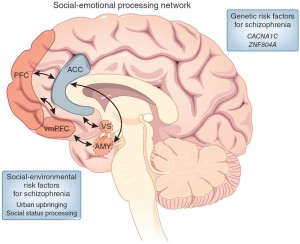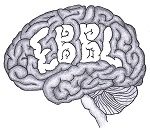Emotion Regulation in Schizophrenia
 (http://www.psycholawlogy.com/2014/05/26/emotional-intelligence-emotion-regulation-ability-helps-lawyers-interact-others-effectively/)
(http://www.psycholawlogy.com/2014/05/26/emotional-intelligence-emotion-regulation-ability-helps-lawyers-interact-others-effectively/)
Schizophrenia is associated with many abnormalities such as hallucinations and delusions, but there are also emotional abnormalities that are common to schizophrenia like impaired expression of affect which is shown by reduced expression of emotion during apparently normal emotional experiences. This aspect of the disorder is seen to be an indicator of a “poor prognosis (Henry, 2008), and is believed to be the result of an error “up-regulating emotion-expressive behavior (Henry, 2008).” In addition to the deficiency in up-regulation, it is also believed that excessive suppression of emotion is used as a regulatory strategy. This implies that the schizophrenic patient is consciously suppressing his or her emotion-expressive behavior and is unable to amplify emotion-expressive behavior (Henry, 2008).
 (http://www.nature.com/nm/journal/v18/n2/fig_tab/nm.2671_F1.html)
(http://www.nature.com/nm/journal/v18/n2/fig_tab/nm.2671_F1.html)
It has been shown that people with schizophrenia “exhibit VLPFC hypo-activation and decreased PFC-amygdala coupling during down regulation of negative emotions by means through reappraisal (Horan, 2013).” Horan examined whether people with schizophrenia can “modulate their electrophysiological responses to unpleasant stimuli through preappraisal-based manipulations of stimulus meaning (Horan, 2013). This study found that schizophrenia patients did not down regulate their LPP [Late Positive Potential – index of ciliated attention to emotional stimuli that is reduced following cognitive emotion regulation strategies (Horan, 2013)] responses and as a result trends of “impaired sensitivity to reappraisal manipulations of emotional stimulus meaning (Horan, 2013)” were shown. Explanations for this inability to down regulate can be attributed to deficiencies in top down cognitive control, which is essential to cognitive reappraisal. Lastly, it was shown that schizophrenia patients had greater utilization of expressive suppression in emotion regulation which has been associated with greater psychopathology. the overuse of suppression can result in the inability “to identify emotion and can lead to maladaptive reappraisal of emotion (O’Driscoll, 2014).
 (http://cuckoostuff.blogspot.com/2011/11/psychopath-vs-normal-people.html?m=1)
(http://cuckoostuff.blogspot.com/2011/11/psychopath-vs-normal-people.html?m=1)
Normal, adaptive emotion regulation includes choosing and using regulation techniques that are context appropriate and involves: pausing, noticing, evaluating the emotion and situation, and acting according to long-term goals (O’Driscoll, 2014). These steps of emotion regulation are distorted in schizophrenia patients are maladaptive. The large role that regulation in brain processes of up-regulation and cognitive reappraisal play in the regulation of emotion in schizophrenia patients. The role of excessive suppression in the regulation of emotion as a strategy contributes to the higher experience of negative emotions in schizophrenia patients than in unaffected patients.
References
Henry, J., Green, M., Rendell, P., McDonald, S., & O’Donnell, M. (2008). Emotion regulation in Schizophrenia: Affective, Social, and Clinical Correlated of Suppression and Reappraisal. Journal of Abnormal Psychology, 117(2), 473-478. Retrieved November 16, 2014.
Horan, W., Hajcak, G., Wynn, J., & Green, M. (2013). Impaired Emotion Regulation in Schizophrenia: Evidence from Event-Related Potentials. Psychol Med., 43(11), 2377-2391.
O’Driscoll, C., Laing, J., & Mason, O. (2014). Cognitive emotion regulation strategies, alexithymia and dissociation in schizophrenia, a review and meta-analysis. Clinical Psychology Review, 34, 482-495. Retrieved November 16, 2014.
